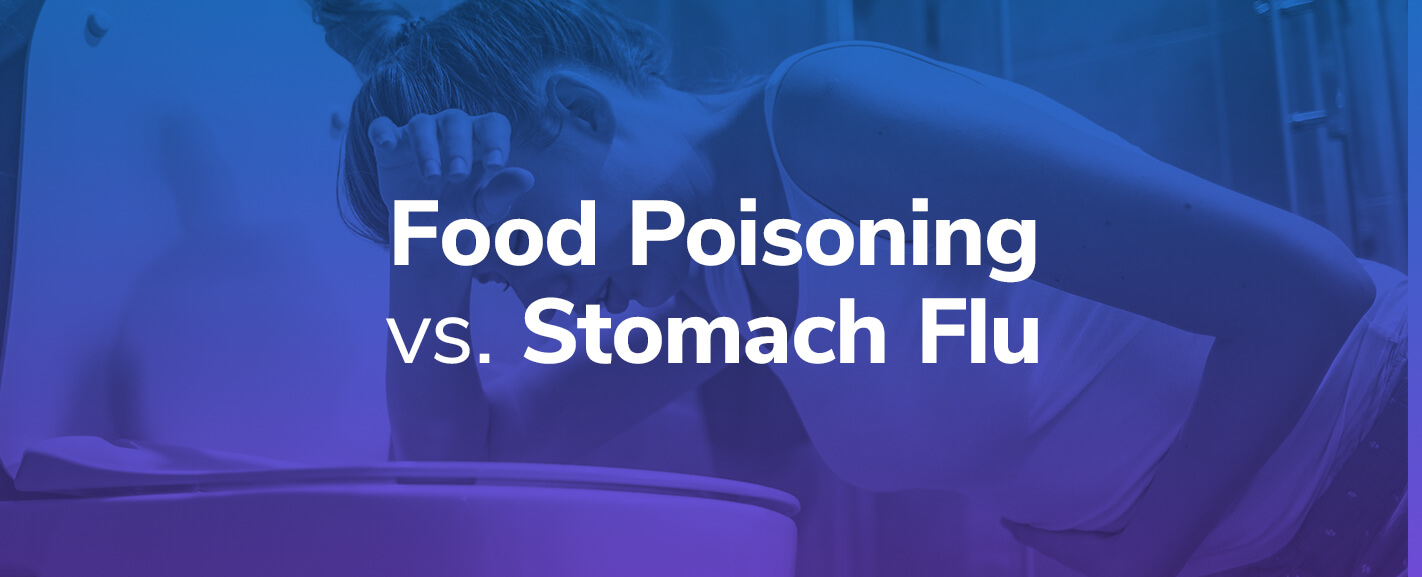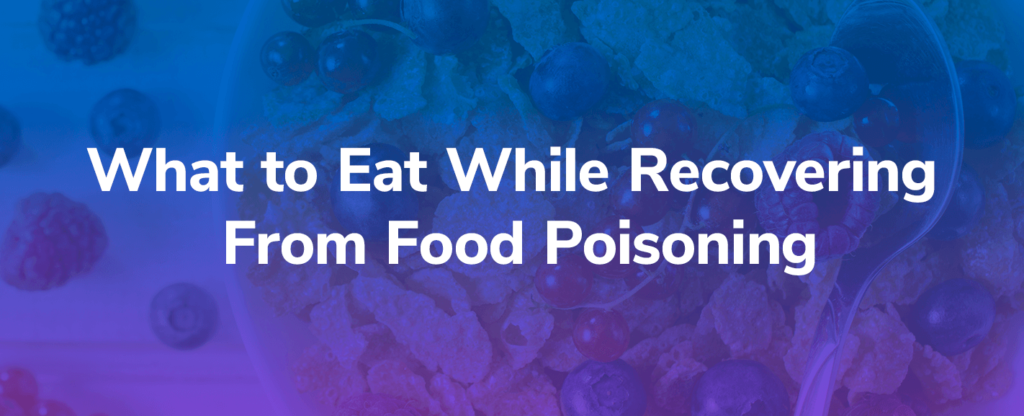Food poisoning and the stomach flu are common conditions that may cause you to feel nauseous, weak and potentially dehydrated. Learn the difference between stomach flu vs. food poisoning, common symptoms, treatments and prevention.
- Symptoms and Causes
- Both Food Poisoning and Stomach Flu Cause Dehydration
- Stomach Flu and Food Poisoning Diagnosis
- Food Poisoning Treatment
- Stomach Flu Treatment
- Food Poisoning and Stomach Flu Prevention
- Key Differences Between Stomach Bug vs. Food Poisoning
- When to See a Doctor for Food Poisoning or Stomach Flu
- Need Relief From Dehydration?
Symptoms and Causes
If your stomach starts feeling sick, it may be tricky to determine if you have the stomach flu or food poisoning because both cause similar symptoms. Although the stomach flu and food poisoning share similar symptoms, they have different causes.
For example, someone may develop food poisoning after eating food contaminated with parasites, viruses or bacteria. On the other hand, the stomach flu, also known as gastroenteritis, is caused by contracting a virus. Despite their differences, each condition can be managed at home. Remaining hydrated is essential to recovering from these conditions.
Food Poisoning Symptoms
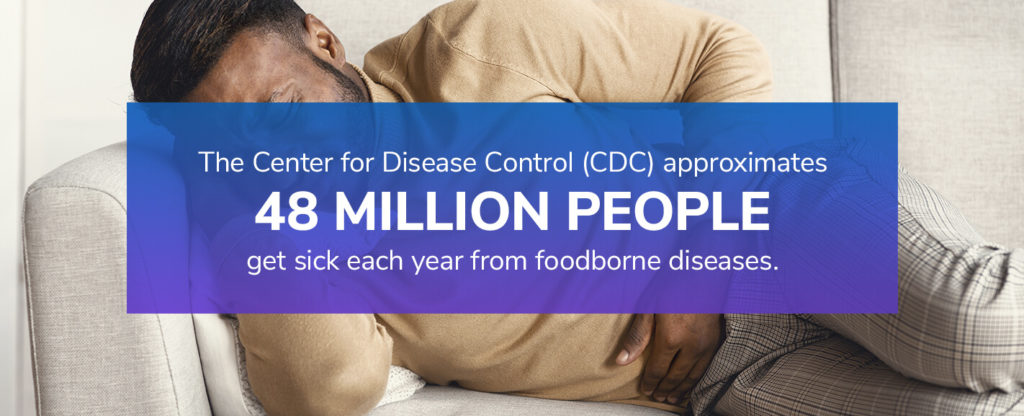
Food poisoning is a common illness, with 31 known pathogens that cause foodborne illnesses. The Center for Disease Control (CDC) approximates 48 million people get sick each year from foodborne diseases. Some of the most common food poisoning symptoms include diarrhea, fever, chills, headaches and muscle aches.
With food poisoning, sweating, thirst, intestinal cramping, stomach cramping and fatigue are also common. Because it is difficult to eat or drink with food poisoning, many people feel sluggish and tired.
While many people develop food poisoning symptoms within a few hours or days after eating contaminated foods, symptoms can take up to a week to develop. The incubation period depends on the pathogen you get exposed to. Fortunately, food poisoning symptoms improve within two or three days.
Stomach Flu Symptoms
The stomach bug causes intestinal and stomach inflammation from a viral infection. Norovirus is the leading cause of diarrhea and vomiting from acute gastroenteritis. Some of the most common stomach bug symptoms include intestinal cramping, vomiting, nausea, fever and diarrhea. In some cases, muscle aches, joint aches and headaches are also possible.
Depending on how long your symptoms last, you may notice minor weight loss and thirst. Because the stomach bug causes diarrhea and vomiting, the body loses essential fluids, causing dehydration. In most cases, people develop symptoms within 12 to 48 hours after exposure to the virus. Fortunately, stomach bug symptoms often improve within a few days, but can last up to two weeks in more severe cases.
While gastroenteritis is commonly known as the stomach flu, it is a very different condition from influenza. The traditional flu affects your respiratory system. The stomach flu affects your digestive tract. While most stomach bug cases don’t need special treatment, more severe symptoms may require medical attention.
Both Food Poisoning and Stomach Flu Cause Dehydration
The stomach flu and food poisoning cause many similar symptoms, including dehydration. Dehydration occurs when the body uses or loses more fluid than it takes in, causing your body not to have enough water to carry out its daily processes. If you don’t replace these fluids, your body will become more dehydrated, leading to more severe symptoms.
While anyone can become dehydrated by not drinking enough fluids, it is more common if you have underlying medical conditions, such as the stomach flu or food poisoning. Common symptoms of dehydration include darker urine, little to no urine output and dryness in the throat and mouth.
In addition to excessive thirst, dehydration can cause a faster heart rate, low blood pressure and dizziness that worsens when standing. If you experience severe or ongoing signs of dehydration, it is important to get a hydration treatment to replenish lost fluids.
If you or a loved one can’t keep fluids down, notice black or bloody stool or have diarrhea or vomiting that persists for more than 24 hours, you may want to see a doctor. Other potential symptoms of dehydration include irritability, disorientation and drowsiness.
Stomach Flu and Food Poisoning Diagnosis
In many cases, you don’t need an official medical diagnosis for food poisoning and stomach flu. If you experience more severe symptoms, you should see a doctor who will give you an official diagnosis and recommended treatment course. High-risk individuals, such as immunocompromised people, should see a doctor sooner.
Diagnosing Food Poisoning
In many cases, most people don’t need an official food poisoning diagnosis because they can assume they have food poisoning. Typically, more than one person is affected if people share or eat the same contaminated food. If you see a physician, they may discuss your medical history, ask about your symptoms and perform an examination. Stool, urine and blood tests can also help determine the infection source.
Diagnosing Stomach Flu
Like food poisoning, the stomach flu is diagnosed with a review of any symptoms you have, discussing your medical history and performing a physical examination. Unfortunately, gastroenteritis is highly contagious, meaning it spreads easily from person to person. You may develop the stomach flu by simply going to a party or gathering of people where someone is sick, even if they don’t show active symptoms yet.
Treatment Options
Following a recommended diet and seeking proper treatment for either condition can minimize uncomfortable side effects and promote a quicker healing process. Although the stomach bug and food poisoning share many similarities, they often require a different treatment approach.
Time is one of the most important aspects of improving symptoms. Your body needs time to rest, recover and fight off the illness. During the recovery process, you can take certain medications and follow a calmer diet. If you can keep food and liquids down, it is best to eat plainer and less processed foods, as these are less likely to upset your stomach.
Food Poisoning Treatment
While time and rest are the fundamental building blocks for a food poisoning treatment, there are other treatment modalities to consider, especially if symptoms become severe. You should speak with your physician to determine which food poisoning treatment might be right for you.
Antibiotics
Your physician may prescribe antibiotics if you develop food poisoning from a specific kind of bacteria. In general, physicians only recommend antibiotics in cases of more severe or long-lasting symptoms. Food poisoning from listeria requires intravenous antibiotic treatments and hospitalization.
It is important to understand that antibiotics will not provide relief of symptoms of food poisoning caused by viruses. In reality, antibiotics can actually worsen symptoms of certain bacterial or viral food poisoning.
Fluid Replacement
Fluid and electrolyte replacements are essential as your body recovers from food poisoning. Because food poisoning causes periodic diarrhea and vomiting, your body loses fluids and essential minerals, including calcium, potassium and sodium. One way to replace these electrolytes and minerals is by drinking plenty of fluids.
While ensuring you drink enough water and fluids each day helps, sometimes, your body still can’t replenish fluids quickly enough. A food poisoning intravenous (IV) treatment is an innovative and effective way to revitalize and rehydrate the body.
An IV treatment is more efficient at introducing essential fluids and minerals back to the body while promoting a stronger immune system to help you recover from food poisoning as quickly as possible.
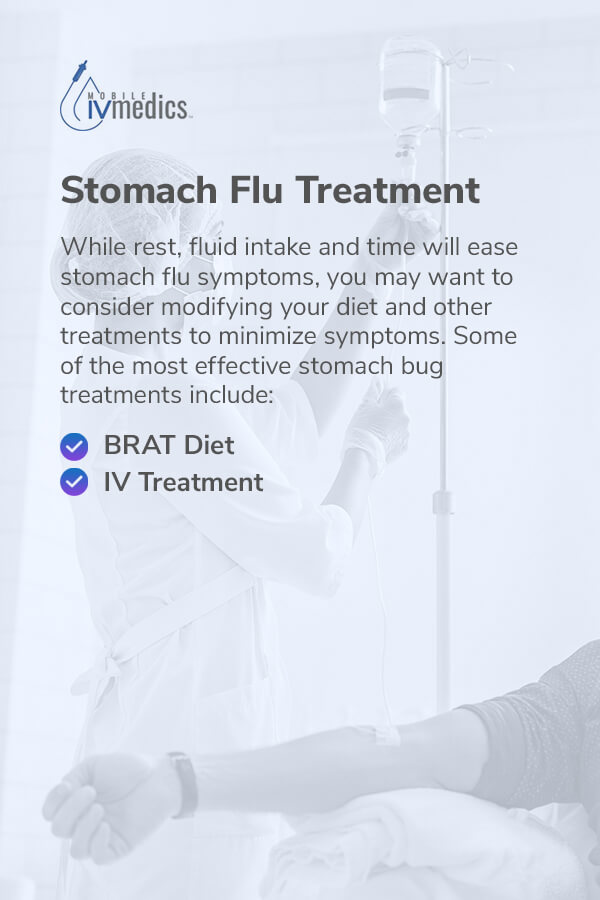
Stomach Flu Treatment
While rest, fluid intake and time will ease stomach flu symptoms, you may want to consider modifying your diet and other treatments to minimize symptoms. Some of the most effective stomach bug treatments include:
BRAT Diet
The banana, rice, applesauce and toast (BRAT) diet is a calmer and more manageable diet if you have trouble keeping food down with the stomach flu. While eating certain foods can help nourish your body, you shouldn’t force yourself to eat if you feel it will make you sicker.
As you gain more of an appetite, the BRAT diet can be a great way to consume easy-to-digest foods that provide your body with energy and nutrients. Bananas are easier to digest and can replenish potassium levels. White rice can provide your body with energy from carbohydrates. You should avoid brown rice because it has more fiber and can cause excess gas.
Applesauce provides the body with sugars, carbs and pectin, which may help ease diarrhea. Finally, white toast is easy to digest and provides the body with important carbs. You should avoid whole wheat bread because it is harder to digest.
IV Treatment
An IV treatment for nausea can improve symptoms of vomiting and nausea at their source. Nausea IV treatments use fluids and anti-nausea medicine to minimize discomfort and stomach flu symptoms and promote a quicker healing process.
If you’re experiencing nausea or symptoms of a stomach bug, you may benefit from an IV treatment to replace antioxidants, nutrients and vitamins your body is missing. IV treatments can be customized to alleviate your unique symptoms or deficiencies.
Food Poisoning and Stomach Flu Prevention
You can follow certain tips to minimize the risk of developing food poisoning or stomach flu. Generally, food poisoning prevention is heavily tied to ensuring you eat properly cooked meals. On the other hand, stomach flu prevention revolves around reducing the spread of germs.
While the stomach bug is contagious and spreads from person to person, food poisoning doesn’t spread in this manner. While many people in a group or family, it is typically because everyone consumed the same or similar meal contaminated with a bacteria or virus.
Food Poisoning Prevention
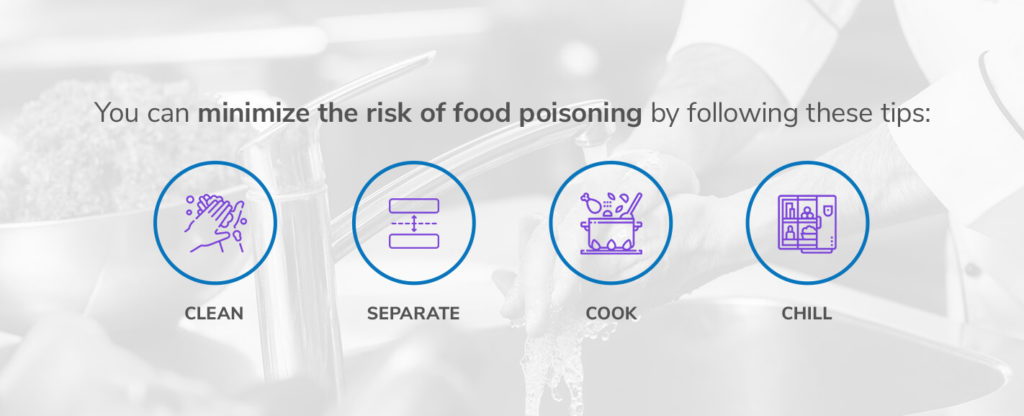
While food poisoning isn’t contagious like the stomach flu, it can be spread through some forms of contact with infected bodily fluids. For example, if a person comes into contact with contaminated fluids and touches their mouth before washing their hands, they may develop food poisoning. You can minimize the risk of food poisoning by following these tips:
- Clean: Washing your hands is important to reduce the spread of bacteria and viruses. If you are going to a restaurant, you should wash your hands before eating. If you are cooking at home, you should ensure your surfaces are sterile before, during and after cooking and preparing food. Germs survive in various places in the kitchen, including countertops, cutting boards and utensils, so you should properly clean these while cooking.
- Separate: Separating food while cooking or preparing food is important. If you have ready-to-eat foods, you should ensure these are separate from raw seafood, poultry and meat. You should also use different cutting boards for raw meat.
- Cook: Cooking foods, especially meats, to the correct internal temperature can ensure no harmful bacteria survive. You should follow the recommended cooking times for all foods and use a food thermometer to ensure the meat is cooked to the right temperature.
- Chill: You should refrigerate all leftovers within two hours of cooking or one hour if the food is exposed to high temperatures, such as in a hot room. You shouldn’t ever keep raw meat out unless you are preparing and cooking it for a meal.
Stomach Flu Prevention
One of the most important ways to prevent the stomach flu is to wash your hands with warm water and soap. You should wash your hands regularly, especially if you change a diaper or use the bathroom. When giving yourself or someone else medicine or preparing, eating or handling food, you should regularly wash your hands.
While many people may use hand sanitizers, washing your hands with soap and water is more effective at removing norovirus particles. Other important tips to remember when preventing the stomach flu include:
- Handle food safely: How you handle food plays an important role in your overall health. Before preparing or eating any vegetables or fruits, you should wash them first. Noroviruses are somewhat resistant to heat, meaning a quick steaming process may not eliminate the virus from the food.
- Rest when sick: If you are sick, you should rest and limit your time around others to minimize the risk of spreading the stomach bug to someone else. You should also not cook while you’re sick because it can greatly increase the risk of spreading the stomach flu.
- Disinfect and clean services: If anyone is sick in your home, routinely disinfecting and cleaning the areas they touch can stop the spread of the stomach bug. If you are sick, it may help to minimize the number of surfaces you touch or rooms you are in to prevent others around you from getting sick.
- Wash laundry: Any clothing that may have come into contact with contaminated bodily fluids should be washed promptly and thoroughly. When handling these clothes, it is best to use disposable or reusable rubber gloves to prevent direct contact.
Key Differences Between Stomach Bug vs. Food Poisoning
While food poisoning and the stomach bug share common symptoms and may be confused for one another, they are two very different illnesses. The formal name for a stomach bug is viral gastroenteritis, which is caused by a viral infection resulting in stomach and intestinal inflammation.
On the other hand, food poisoning is caused by consuming contaminated water or food. Food poisoning is also an umbrella term used to describe hundreds of waterborne and foodborne illnesses. Food poisoning often requires unique treatment, depending on the bacteria or virus that causes symptoms.
When to See a Doctor for Food Poisoning or Stomach Flu
Although you can manage food poisoning symptoms at home, you may need to see a doctor if you notice severe symptoms. One of the most important reasons you may need to see a physician for is dehydration. More severe cases of food poisoning or a stomach bug may cause bloody vomit or stool, loss of consciousness and severe stomach pain.
You may want to consider seeing a physician if you notice these extreme symptoms or a fever above 104 degrees Farenheit. You should also pay attention to signs of dehydration, including little to no urination, deep yellow urine, dry mouth and excessive thirst.
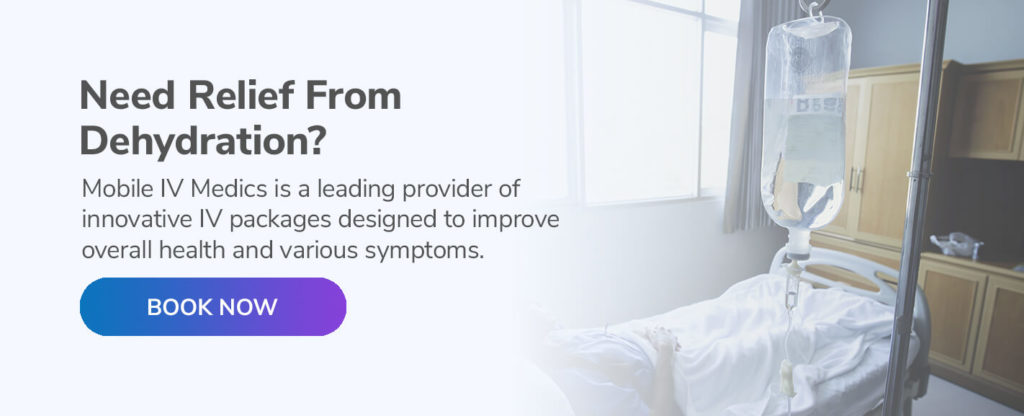
Need Relief From Dehydration?
Mobile IV Medics is a leading provider of innovative IV packages designed to improve overall health and various symptoms. We are a completely mobile company and bring IV packages directly to your door. Some of our most popular IV packages include energy & focus, hydration, migraine & headache, hangover and recovery.
Contact us online to learn more about our IV packages and schedule an appointment.
